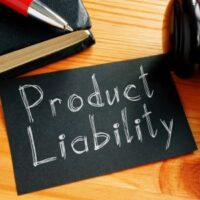Illinois Jury Awards $7.1M to Woman Severely Burned in Cooking Spray Mishap

An Illinois jury has awarded a Pennsylvania woman $7.1 million in a personal injury product liability lawsuit filed against Conagra Brands. According to the lawsuit, the woman was badly burned when a can of commercial-brand cooking spray ignited and exploded in a kitchen at her workplace, setting her on fire. The plaintiff was working in a social club kitchen in 2017 when a can of Swell cooking spray “suddenly and without warning, exploded into a fireball, causing burns and injuries.” The plaintiff suffered second-degree burns on her head, face, arms, and hands. Scar tissue continues to restrict her movement 6 years after the accident.
The jury ordered the Chicago-based company to pay $3.1 million in compensatory damages and another $4 million in punitive damages. Conagra Brands is the parent company of Pam, Swell, and numerous other high-profile brands.
Elements of negligence
Conagra Brands is facing more than 50 other cases filed by burn victims who claim that their cooking spray ignited and exploded causing burn injuries. Conagra has refused to issue a product recall for the allegedly defective cans. The accidents concern spray can models of various brands manufactured between 2011 and 2019. These cans used a venting system with a lower threshold for heat than previous versions, according to the plaintiff’s attorney. When the can gets too hot, vents at the bottom of the can open up to release pressure, discharging flammable contents into the air, the lawsuit contends. Conagra Brands is accused of manufacturing and designing an intrinsically defective can that can cause injury under a variety of normal circumstances.
Conagra contends that its cans are safe when used properly and stored correctly. They indicated that they disagreed with the jury’s verdict and will be exploring their options for appeal. The can clearly warns customers not to use it near heat or an open flame because the contents are flammable.
The plaintiffs counter that the can was stored about 18 inches above a stove, which is a normal place to store a can in a commercial kitchen.
Product liability lawsuits
Product liability lawsuits are filed against companies that manufacture dangerous or defective products. Plaintiffs can make one of three claims in a product liability action. They can claim that the product is intrinsically dangerous or defective, a manufacturing defect led to their injury, or that the company failed to warn them about a potential danger involving the product. In this case, the plaintiffs are arguing that the cans had an intrinsic design defect that rendered them more susceptible to igniting. The plaintiffs contend that the cans are unreasonably dangerous even when used in a responsible manner. The defendants deny this claim, but a jury found that the plaintiff’s argument was more convincing. More lawsuits will follow this one.
Talk to a Champaign, IL Product Liability Attorney Today
Have you been injured by a dangerous or defective product? Call the Champaign, IL product liability attorneys at Patel Law, PC today to schedule a free consultation and learn more about how we can recover damages related to your medical expenses, lost wages, and reduced quality of life.
Source:
apnews.com/article/pam-spray-fire-burn-conagra-lawsuit-swell-536d629af220f359a51b164bf3b873eb
